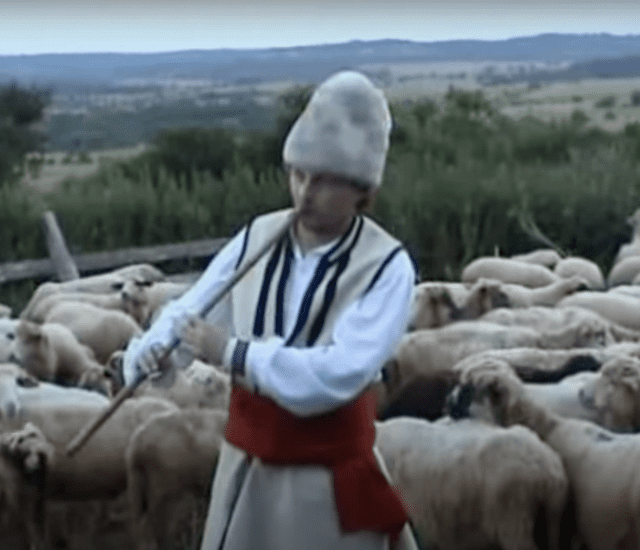Shopski is a group of related dialects spoken by the Shopi people who reside in the Shopluk area, a mountain region on the borders of Serbia, Bulgaria and North Macedonia. The origin of the term Šop varies, etymologically meaning highlanders in Serbian, and a pastoralist tool in Bulgarian.
Shopi began to be denoted as a subgroup of Bulgarian or Serbian ethnos in the 19th century, developing their own distinctive tradition. There has been a lot of discrimination and harmful stereotypes associated to Shopi, claiming them too stubborn, selfish and conservative. This is present in literature, proverbs, music and cautionary tales for children.
Aleksandar Vasov - Mila Sestro, Stara Planino (Dear Sister, Old Mountain)
The Shopski dialects are Bulgarian and Serbian dialects spoken mostly around the mountainous villages around the border. The dialects themselves share similar features in phonology and parts of morphology with Bulgarian and Serbian, but represent a mix of both languages, with one language’s influence stronger the closer one approaches either territory.
In the last decade, the region where Shopi predominantly live, the Stara Planina (Old Mountain), has been endangered by plans to build hydro power plants that would endanger the local ecosystem. The energy from these power plants is insignificant compared to the rich flora and fauna of the region, claim locals and environmental activists. Some of the biggest advocates for its preservation have been speakers of the Shopski dialect, who were born in and have lived their entire lives in the Old Mountain area. It comes as no surprise that the songs sung in this dialect and which portray the beauty of the Old Mountain have become a hymn for environmental activists.
Folk songs such as Mila sestro, Stara planino (Dear Sister, Old Mountain) and Majko le Stara planino (Oh Mother, Old Mountain) portray the maternal symbolism of nature giving birth to all life, and the importance of its purity to the local Shopski-speaking people. The lyrics, describing the local village and shepherdesses, emphasise the central role of the Old Mountain landscape in Shopi’s lives. The latter song compares the beauty of a girl to the Old Mountain, a story of infatuation both with women and nature as a whole. The unrefined beauty of the Old Mountain is a leitmotif in these songs, not only as the backdrop of the shepherds’ lives and love-inducing encounters, but also as an omnipresent standard of beauty and goodness in Shopski folk songs.
Dejan Najdanović Najda - Majko le Stara planino
These songs, both ancient and newly-composed in the dialect, are important not only for the purpose of activism but for the preservation of the dialect itself. The South, and this dialect in particular, is often looked down upon in Serbia as savage and uneducated. This movement comes at a time when more and more young people are moving out of the region, slowly replacing their dialects with what is considered more acceptable in Serbia. Thus, the symbiotic relationship between environmental activists and Shopi is more important than ever. That these songs are reaching a wider audience is crucial for the preservation of the environment and the Shopski dialects alike.
This article is a result of a collaborative project between #AuxSons and Alejandro Abbud Torres Torija, lecturer at Sciences Po Paris Campus Reims, and regular contributor to #AuxSons. As part of the class “Languages of the World/ World of Languages”, international students from Sciences Po Paris Campus Reims prepared articles presenting contemporary music from different parts of the world in connection with recent socio-political events.
The authors :
Isabella Farbahi is a second-year student at the Sciences Po Reims Campus majoring in Political Humanities and minoring in International Relations. She is Iranian-Canadian living in Vancouver, Canada. She loves learning languages, and is currently learning Italian, Spanish and Farsi. Her hobbies include Model UN, painting, singing and playing ultimate frisbee on weekends.
Nikola Pejić is a second-year student at Sciences Po Paris, majoring in Political Humanities with a regional focus on Europe and North America. Alongside Serbian, his mother tongue, he speaks French, German and Spanish with varying degrees of fluency. He is passionate about visual arts, baking, music, literature and everything pop culture.


